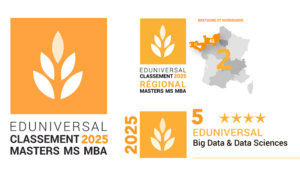Armand, student in the Master for Smart Data Science
After a master’s degree in economics at the University of Cambridge, Armand Lebbe joined ENSAI’s master for Smart Data Science class of 2023. This one-year program was an opportunity to build skills in statistics and machine learning, for a career in data science applied to finance. A few months before his graduation, Armand looks back on his experience at ENSAI.
The Master for Smart Data Science at ENSAI is a program taught entirely in English. Lectures in statistics, applied mathematics and computer science are given by academics and professionals in Data Science during the first semester, followed by a 6-month internship.
How I came to study data science
Armand Lebbe : “My name is Armand, and I’m a dual French-US citizen. I attended school in France up until I earned my baccalauréat in 2018. Then, I moved to Amsterdam to study economics. In 2021, I earned my bachelor’s degree from the University of Amsterdam and began pursuing a master’s degree in economics at the University of Cambridge.
When I first arrived in Cambridge, I thought that I would continue to the economics PhD program after finishing the master’s degree. However, I quickly realized that I was more interested in econometrics than in developing theoretical economics models. So, I filled my second semester at Cambridge with courses focusing on econometrics and its applications to finance.
In an asset management course, I discovered techniques such as penalized regressions, random forests, and gradient boosting. This made me want to work at the intersection between the worlds of finance and of machine learning, but I realized that I needed a stronger statistical and programming background to do so.
I chose ENSAI’s Master for Smart Data Science because it seemed intensive and fast-paced. I already had one master’s degree and I didn’t want to study for another 2 years before starting to work. I wanted a program that would teach me everything I needed to know in a short amount of time. In retrospect, I would say that the program completely delivered on this expectation.
A fast-paced program to acquire theoretical and hands-on skills
I found that the very small class size and the excellent pedagogical skills of most professors made the first semester very engaging. The courses all provide excellent introductions to their respective topics, and over the course of the year, I was able to drastically improve my practical skills through the hands-on projects in each course, as well as the Smart Data Project.
During my bachelor’s and at the University of Cambridge, I had relatively few contact hours. I was expected to do the majority of my studying on my own. This system has many merits, but I also enjoyed the fast pace and numerous opportunities to interact with peers and teachers afforded by the French system, which has many more class hours. I found this system easier and less stressful, because if one attends class regularly, it is much more difficult to fall behind on the syllabus than if one is left to one’s own devices.
I particularly enjoyed François Portier’s machine learning class – partly because of the lecturer’s great teaching skills, and because it provided a concise but comprehensive introduction to the field of machine learning. Before this course I didn’t even know what machine learning was in relation to the econometrics I had studied at Cambridge, but I walked away with a very clear overview of the field, knowledge of essential supervised learning algorithms, and much better Python skills.
I think the program provided ample opportunity to implement what we learnt in class ourselves. We had to submit a project for every class, which meant that we saw how to implement the algorithms we learnt in code.
I also appreciated the fact that we still learnt the mathematics/statistics behind the models we implemented; my math skills improved exponentially over the course of the year.
A 6-month internship at Crédit Agricole – Corporate and Investment Bank
I am an intern in the Risk & Permanent Control department of CA-CIB. Among other things, the team I’m working with is in charge of calculating the bank’s Value at Risk and Stress Value at Risk. My internship project involves developing proxies for missing data in the time series of financial returns used to calculate these risk indicators. Doing this job for a couple of months now has made me realize that knowing how to use pandas and numpy for data manipulation is at least as important as being able to tune supervised learning models! In this respect, I think that the numerous projects which were assigned during the program prepared me very well.
I am in the process of being hired by CA-CIB, in the same team that I currently work in. I thoroughly enjoy the culture and the projects in this team and hope to work in it for several years. If that falls through, I will search for other data science or econometrics jobs in the financial sector to make use of my dual background in machine learning and in finance.
As a data scientist, it’s very useful to have domain-specific insights about the data you’re working on!
A piece of advice for a student who is looking to join the program: if you’re unsure about your mathematics skills before joining, brush up on linear algebra and probability over the summer. If you don’t know either Python or R, follow one of those 6-hour long YouTube coding videos; that should be plenty to not be left behind at the start of the year.”
Looking to become a data scientist? Find out more about the Master for Smart Data Science



